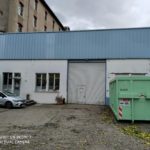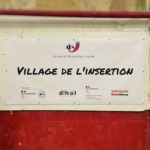In search of self: the body and identity of the marginalized in Nancy's ''Village d'insertion"
Aesthetic care does not seem to be a priority in social work with the homeless. Here, however, we seek to assess the extent to which aesthetic care can contribute to the reappropriation of the body and identity.
The role of socio-aesthetic intervention in self (re)construction
The deterioration of the body and identity of homeless people is both a cause and a consequence of their marginality, especially when they have been living on the streets for a long time. The aim of this research is to see how social intervention and stabilization (and more specifically, socio-aesthetic intervention) can contribute to rebuilding the body and identity of people living in an “Integration Village”. The pragmatist approach we have developed enables us to grasp in deeds and words the effects of stabilization on the (re)construction of the self (both body and identity), and in particular the reception of a socio-aesthetic intervention: we hypothesize that this intervention on the body, well-being and physical appearance can be a lever towards the reappropriation of the self (body and identity) and of one’s personal history.
Between research and social intervention
The research is taking place in a “Village d’insertion” (integration village), with “low threshold” requirements, set up as part of the AMI (Appel à Manifestation d’Intérêt) “Grande marginalité” (call for expressions of interest) launched by the DIHAL (Délégation Interministérielle à l’Hébergement et à l’Accès au Logement) and the DIPLP (Délégation Interministérielle à la Prévention et à la Lutte contre la Pauvreté) at the end of 2020. This accommodation facility takes in around fifteen people defined as “extreme outsiders”, i.e. people with addiction problems, psychiatric disorders and/or prison experience, who were chronically or permanently on the streets. The main challenge of the research was to establish links with these people, to share their daily lives and hear what they had to say. Over and above the ethnographic approach deployed on the site, the aim is to evaluate the implementation and relevance of a socio-aesthetic intervention that will be put in place during the year of the research.
Social reintegration: resources and obstacles
This research is intended to be directly linked to social intervention: it asserts and assumes its operational scope, in particular with the funders of the Village d’insertion, but also with the French Red Cross. The experimented social action consists first of all in stabilizing people in a habitat before working on their recovery and social support. By assessing the effects and limits of a socio-aesthetic intervention on the target groups, and by analyzing the interactions between caregiver and cared-for within the Integration Village, the aim is to highlight the resources and obstacles (institutional, interactional, physical, identity-related, etc.) to recovery and social reintegration, in terms of the body, health, identity and socio-profession. The aim is also to identify the obstacles and levers to the rebuilding of the body and identity of the “great outsiders”, in particular by focusing on their relationship with the body, their resistance to identity and the relationships (interactions) that develop with the various parties involved.
Research from the Bénévo’Lab program
This research was conducted as part of Bénévo’Lab, the Foundation’s research program initiated by those who carry out French Red Cross actions on a daily basis. Bénévo’Lab offers all volunteers and employees of the French Red Cross the opportunity to benefit from technical and scientific support in answering questions or operational difficulties encountered during Red Cross missions. Not everyone in action always has the time or the necessary distance to reflect alone on their actions and the problems they encounter. The Red Cross Foundation proposes to involve, for one year, a university specialist who is an expert in the question raised, in constant and direct contact with the volunteer or employee and his or her missions. At the end of the call for proposals launched at the beginning of 2021 to all volunteers and employees of the French Red Cross, a project proposed by a volunteer on the theme of the relationship with the body and self-esteem of homeless people was selected. The subsequent call for research grants was therefore based on the initial proposal of a volunteer and her active participation in its drafting alongside the Foundation. Thibaut Besozzi, the winner of this call for proposals, conducted her work in direct collaboration with the volunteer at the origin of the project, to ensure that the men and women working in the field on a daily basis would benefit from the experience and results of the research, and that their action in the service of the most vulnerable would be strengthened as a result.
Biography
After obtaining a Master’s degree in sociology from the University of Lorraine (Nancy) in 2011, Thibaut BESOZZI embarked on a thesis, under the co-direction of Philippe Chanial and Hervé Marchal, first at the University of Paris-Dauphine, then at the University of Caen-Normandie, where he will support his thesis at the end of 2015. At the crossroads between urban anthropology, the sociology of marginality and the sociology of social work, his research adopts an ethnographic and anthropological perspective, analyzing urban public space, the various marginalized populations that find their place there, and the modalities of social reaction (both assistancial and security-based) that they give rise to. Since 2017, he has been focusing on homeless people, questioning in particular their socialization dynamics in the “street world” and the identity tensions that run through their experience of homelessness (between bodily issues and self-esteem).




